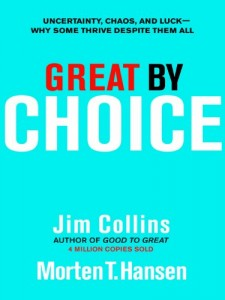At Positioning Systems and Gazelles you know by now that we’re big fans of Jim Collins books Good to Great, Built to Last, and How the Mighty Fall. When Collins new book, Great by Choice arrived last week I just had to pick it up. If you receive Verne Harnish’s weekly newsletter you know that he’s reading it as well.
Great by Choice answers the question: Why do some companies thrive in uncertainty, even chaos, and others do not?-resized-600.jpg)
When companies are buffeted by tumultuous events, hit by big, fast-moving forces that can neither be predicted nor controlled, what distinguishes those who perform exceptionally well from those who underperform or worse? How do some companies perform well when no one knows what’s coming next?
Some companies and leaders navigate this type of world exceptionally well. They don’t merely react; they create. They don’t merely survive; they prevail. They don’t merely succeed; they thrive. They build great enterprises that can endure. Collins does not believe that chaos, uncertainty, and instability are good; companies, leaders, organizations, and societies do not thrive on chaos. But they can thrive in chaos.
The companies and leaders who thrive in these circumstances Collins and his team call 10Xers. They labeled these high-performing study cases with the moniker “10X” because they didn’t merely get by or just become successful. They truly thrived. Every 10X case beat its industry index by at least 10 times.
These 10Xers met three basic tests:
1. The enterprise sustained truly spectacular results for an era of 15+ years relative to the general stock market and relative to its industry.
2. The enterprise achieved these results in a particularly turbulent environment, full of events that were uncontrollable, fast-moving, uncertain, and potentially harmful.
3. The enterprise began its rise to greatness from a position of vulnerability, being young and/or small at the start of its 10X journey.
I’ve not completed it all, in fact I’m about 25% done. So far there’s a wealth of information to share. The part that didn’t surprise me and shouldn’t surprise you if you’ve read any of Collins previous work is that the findings support the concept of Strategic Discipline. In fact these companies and their leaders weren’t just disciplined, they were fanatically disciplined.
Of course I’ll have more to follow next blog.






.jpeg?width=150&height=135&name=Hand%20with%20marker%20writing%20the%20question%20Whats%20Next_%20(1).jpeg)

